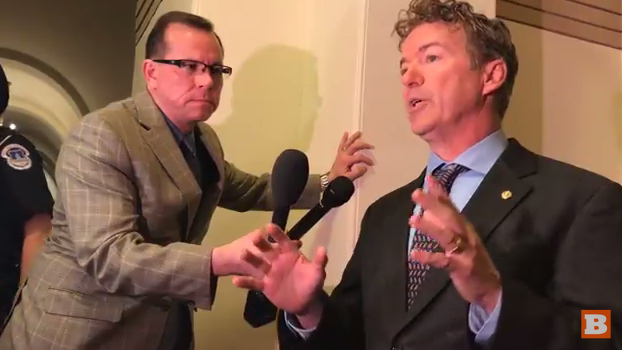Trust but verify. That appears to be the approach that Sen. Rand Paul (R-Ky.) is taking when it comes Republican leaders’ promises to repeal Obamacare—a key campaign promise from the 2016 election.
Leading a gaggle of reporters on March 2 to where he thought was the office at the House office building in Washington, D.C. where the health care law repeal draft legislation was being kept, Paul demanded to see the bill but was turned away.
“I think there’s a bill in there. It’s the secret office for the secret bill,” Paul told reporters.
Paul has a point. S. Con. Res. 3, the budget resolution that lawmakers promise will be the vehicle for repealing Obamacare via the reconciliation process, still does not contain the text of the repeal. When will we see it?
Last year, the Congress passed, and former President Barack Obama vetoed, H.R. 3762, which include ending Medicaid expansion, premium subsidies, cost-sharing subsidies, the individual and employer mandates, reinsurance, risk corridors and risk-adjustment, and the taxes and spending from the health care law.
But now Paul warns that not even all the parts that were repealed last year may be included in this year’s version, warning that provisions ending the individual mandate and the Cadillac tax might be stripped. Yet, those are clearly budget provisions and could be included, just like last year.
Being a budget bill, there are rules that do not include everything, which is why H.R. 3762 left out the so-called essential health benefits, pre-existing conditions, or allowing younger Americans to remain on a parent’s plan until the age of 26.
In a statement Americans for Limited Government President Rick Manning called the reconciliation process “flawed,” declaring, “the inevitable outcome will be more federal regulation with minimum coverage standards imposed on states that will once-again be robbed of decision-making, driving health care costs upward for all Americans.”
To deal with that problem, Manning said if Obamacare could not be repealed in full via reconciliation, then the Senate should simply eliminate the legislative filibuster — the same way the filibuster for executive branch and judicial nominees was — that requires 60 votes in that chamber to pass a bill.
This would allow the health care law to be repealed in its entirety, and “passing a replacement that returns health care governance to the states from where it was stolen by the previous Administration.”
On that count, Manning pointed to a proposal by the Texas Public Policy Foundation that Manning said could be a template for replacing the system set forth under Obamacare.
“The Texas Public Policy Foundation has set out key principles that Congress really ought to consider for repealing Obamacare while respecting the role of states to meet the needs of their own citizens,” Manning said, adding, “It is time to let state laboratories work. Drawing up a new health care law that does not eliminate all of the national mandates behind closed doors robs states and the people from having a role in this process.”
But, Manning warned, getting this issue wrong would have political ramifications, “Any attempts to simply fix Obamacare using the reconciliation as a dodge as to why they could not do more will not succeed either politically or from a policy perspective. Republicans get one real bite of this apple. They should return to their core principles by repealing Obamacare and respecting the states’ Constitutional role in health care.”
Otherwise, voters who supported President Donald Trump and Congressional Republicans in 2016 may wind up with buyer’s remorse.
Sen. Paul is right. This is why everyone needs to see the bill before it’s voted on. Before it’s declared the final product. So that the American people can offer input and if some provision or another is a non-starter, they can say so — before it’s too late.
Robert Romano is the senior editor of Americans for Limited Government.







